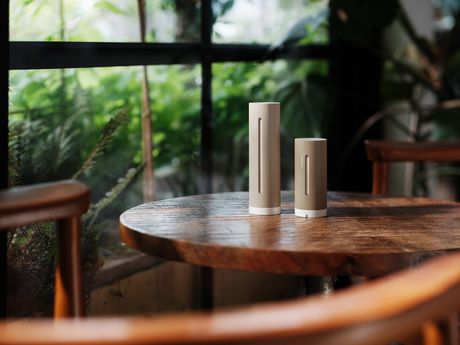
Netatmo presenta la nuova Stazione Meteo ORIGINAL

Fino al 50% di sconto su una selezione di prodottiAcquista

Sebbene sia impossibile indovinare l'orario prediletto dai ladri (i fattori in gioco sono troppi), ci sono vari aspetti ricorrenti che possono tornare utili per anticipare le mosse dei malviventi e non farsi trovare impreparati. Li riassumiamo per comodità in forma di lista, prendendo spunto da quanto rilevato negli ultimi anni da studi di settore e statistiche ufficiali.
I Sensori Intelligenti per Porte e Finestre Netatmo ti informano prima che abbia luogo un’intrusione. Posizionati sulle porte e finestre da te scelte, rilevano ogni movimento o vibrazione che indichi che qualcuno sta cercando di forzarle.
Per quanto sia facile da intuire, giova ribadirlo ancora una volta: l'assenza da casa è un segnale tenuto in grandissima considerazione dai ladri. A qualunque ora del giorno e della notte, i ladri sorvegliano i tuoi movimenti per capire quando gli conviene entrare in azione. A nessun malintenzionato, come invece suggerisce la cinematografia, interessa immobilizzare gli occupanti e cercare rogne. Molto più semplice e molto più pratico è organizzare i furti in appartamento o in ville incustodite (vale ovviamente anche per uffici, magazzini, capannoni, concessionarie, showroom, negozi, banche, gioiellerie e altro genere di locali e immobili). Non a caso la maggioranza dei furti avviene quando nessuno è presente, o perché a lavoro, o perché in ferie, o perché in giro a portare fuori il cane, o addirittura perché in giardino a potare le siepi o il prato, magari con le classiche cuffie per isolarsi dal rumore… e non sentire i ladri in azione. Prendere di mira un'abitazione sgombra, per i ladri, è un'opzione decisamente più sicura di quanto potrebbe essere l'equivalente incursione mentre gli occupanti stanno dormendo o sono seduti a tavola. Ecco perché è fondamentale valutare l'implementazione di un sistema di videosorveglianza attivo 24 ore su 24, in grado di attivarsi alla minima rilevazione di movimento negli spazi esterni e, se operativo, interni della casa. Questo non solo per ragioni di sicurezza, come vedremo fra poco, ma anche per garantire l'archiviazione di prove certe da fornire ai periti assicurativi (oltre che alla polizia).
Grazie al Sistema di Allarme Video Intelligente Netatmo proteggi la tua abitazione con una soluzione completa di sicurezza in grado di difenderti dalle intrusioni. Oltre a offrire tutte le precauzioni necessarie per impedire i tentativi di intrusione, il tuo Sistema di Allarme Video Intelligente Netatmo comprende anche una gamma di suoni preregistrati: abbaio di cane, pianto di bambino o rumore di aspirapolvere.
Evitare furti in casa non significa difendersi dai ladri e dalle loro aggressioni. Questa eventualità, nel complesso, è piuttosto rara in relazione alla totalità delle casistiche. Più frequente e più rilevante, come abbiamo scritto finora, è l'effrazione in assenza di occupanti. E nella percentuale di effrazioni senza occupanti, sta assumendo sempre più rilievo il furto… senza effrazione! In che cosa consiste questa tecnica particolare, nota anche come home jacking? In sostanza il ladro si palesa sotto false sembianze, come venditore, mendicante, giornalista, rappresentante: una volta aperta la porta, il ladro tenterà di entrare con la scusa di un bicchiere d'acqua o simili. Avendo piede libero, a quel punto, il malvivente proverà a recuperare le chiavi della macchina, il portafoglio, il computer portatile, il telefonino… insomma, tutto ciò che riesce a sottrarre senza sforzi e senza scassi, per poi svignarsela a mani piene. Perché questo tipo di crimine è così subdolo? Perché oltre al danno si può aggiungere la beffa del mancato risarcimento. Qualora tu abbia un'assicurazione attiva, infatti, dovrai fornire prove tangibili del furto. La denuncia ai carabinieri o alla polizia potrebbe non essere sufficiente a documentare l'avvenuta ruberia. Occorrerà dunque fornire ai periti le riprese video o le immagini dei ladri in azione, dimostrando così in modo oggettivo che l'automobile o i gioielli sono stati effettivamente sottratti indebitamente. La soluzione, in questa prospettiva, diventa affidarsi alle telecamere di sorveglianza, strumenti essenziali per monitorare l'area e, appunto, archiviare quanto accade all'interno e all'esterno della proprietà 365 giorni l'anno. Non ti resta dunque che scegliere l'impianto o il kit più adatto alle tue esigenze, confrontando ciò che offre il mercato sulla base delle tue abitudini, delle tue necessità e della familiarità con le tecnologie.